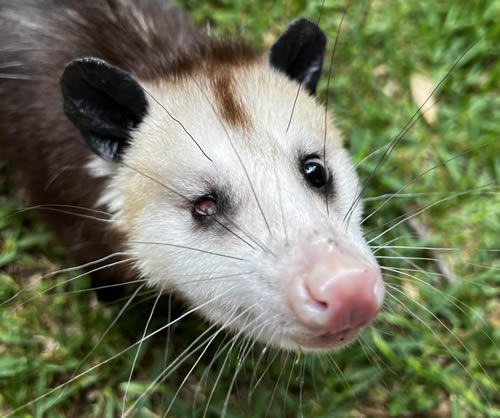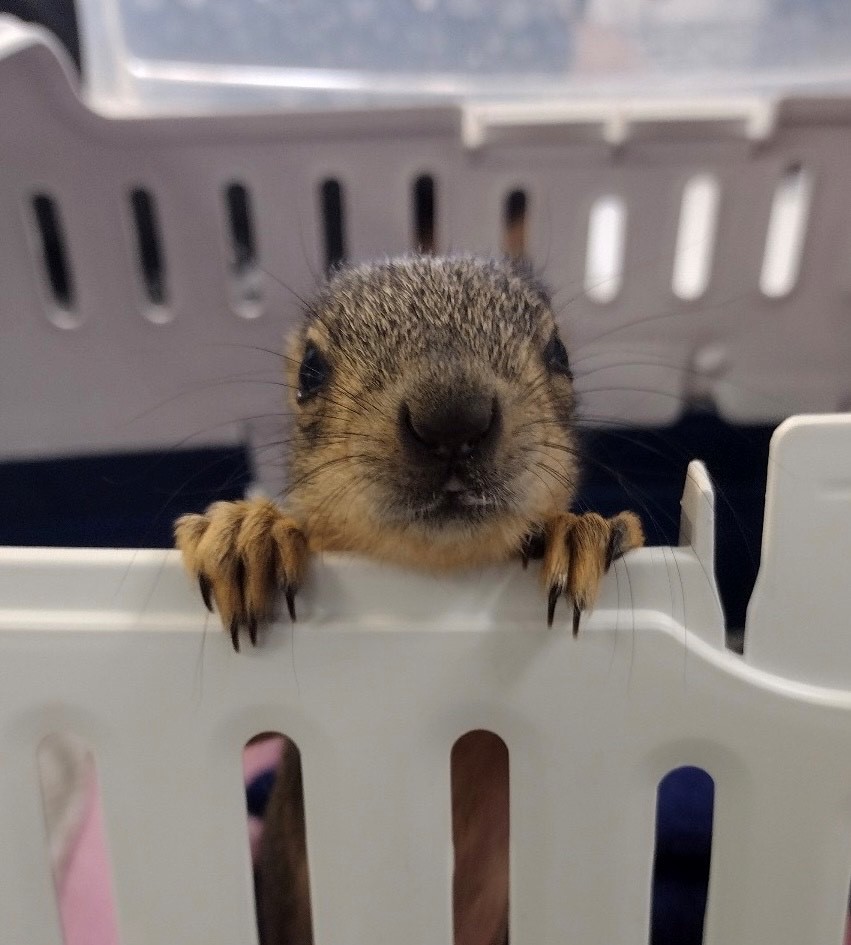For unidentified small mammals like mice, rats, shrews, and voles, see the information below. For squirrels, rabbits, opossums, and other medium mammals, click HERE to be directed to the mammal page.
Have you found a BABY rodent?
If the baby’s eyes are closed and it moves around on its belly, you can attempt to reunite the baby with its mother. Please do not attempt this if the baby is:
- Injured
- Caught by a cat/dog/hawk
- Flies are circling
- Dehydrated (pinch the skin on its back and if it does not return to its original shape within one second then it is dehydrated)

Reuniting Instructions: The “X Test”
*Always use gloves to handle wildlife!
- Check if the baby or babies feel cold. If they are cold, line a cardboard box with a t-shirt and place the rodent inside. Place the box half on and half off a heating pad. (If you do not have a heating pad, heat up a towel in the dryer to wrap them in). Warm the baby for one hour before attempting to re-nest.
- Place the baby back in the nest.
- Use gloves to cover the nest back up with the dried grass + fur mixture
- Fashion a large “X” on top of the nest using pine needles, leaves, or pieces of grass. The center of the “X” should be over the center of the nest with the edges of the “X” overlapping the edges of the nest. (NOTE: some sources may suggest using string, but the scent of string or any other unnatural materials may be enough to scare the mom from returning).
- Take a photo of the X to compare to later
- Leave the nest area undisturbed for 12 hours (keep any pets out of the area too)
- If the pattern is displaced or pushed aside but the nest is still covered, the mother is caring for them.
If the "X" is undisturbed after 12 hours, please call 713-468-8972 and make an appointment to bring the babies in for care.

Have you found an INJURED or ILL rodent?
If you find a small mammal of any age that is:
- Caught by a cat or dog
- Visibly injured
- Unable to walk
- Limping or dragging a limb
- Lethargic
- Covered in ants or flies
Please contact us at 713-468-8972 as soon as possible to determine further steps. If we are closed, leave a voicemail and follow the Temporary Care Instructions below.
Note: Domestic or pet rodents should not be brought to a wildlife center because they are non-native species. Bring them to a vet or domestic shelter instead.
Found an unwanted rodent in your home?
If the nest is found in your home, it is better to move all the babies and as much of the nest as possible. Keep the nest as close as possible to where it was originally found while being outside (if the nest was found near the front of the home move to the front yard, if the nest is found near the back of the home move the nest to the back yard. Place straw or grass over the nest and take a photo. Wait overnight to see if the mother has disturbed the nest, if she has moved the grass or relocated the babies then the job is done, if the grass is not moved then the mother has not come and the babies need to be brought to a wildlife center for care.
Please click HERE for instructions on how to humanely deter rodents from the home or shed.
Temporary Care Instructions for ALL Animals:
- Houston Humane Society Wildlife Center (HHS Wildlife Center) recommends that you wear gloves or use a cloth barrier when handling wildlife.
- Prepare an appropriate-sized cardboard box by poking air holes in the top and placing a soft cloth (T-Shirt, towel, paper towels) in the bottom. DO NOT put the animal into a plastic bag.
- Place the animal into the prepared box and tape the box shut. For injured adults, place the box on its side next to the animal and use a stick, broom, or rolled-up newspaper to gently push the animal into the box.
- Do not give the animal any food or liquids. Feeding an animal an incorrect diet can result in injury or death. In addition, rescued animals can get wet from liquids and become hypothermic and/or spill food on their fur/feathers, potentially causing damage.
- Keep the animal in a warm, dark, quiet place. Darkness makes the animal feel more secure. If the animal is a baby, the box can be placed half on and half off a heating pad set on low. If the animal gets too warm it will move to the other end of the box. Do not place adult animals on a heating pad.
- Leave the animal alone. Human noise, touch, and eye contact are very stressful to wild animals and can result in shock or even death. This is especially important in the case of injured or adult animals.
- If an animal has been caught by a cat or dog, please call HHS Wildlife Center immediately at 713-468-8972. Even if wounds are not visible, the animal needs medical intervention as soon as possible.
- Keep children and pets away. BE CAREFUL! An animal that is hurt or frightened may bite.
- Call HHS Wildlife Center at 713-468-8972 as soon as possible!
General Information about Rodents in the Houston Area
There are many species of rodents in the Houston area, including, but not limited to, Black Rats (Rattus rattus), Brown Rats (Rattus norvegicus), Deer Mice (Peromyscus maniculatus), House Mice (Mus musculus), and Meadow Voles, (Microtus pennsylvanicus). Most rodents share a strong family connection and typically reside in colonies. They play a crucial role in sustaining predator populations, managing insect numbers, and assisting in seed dispersal.


